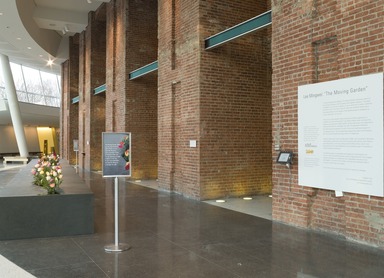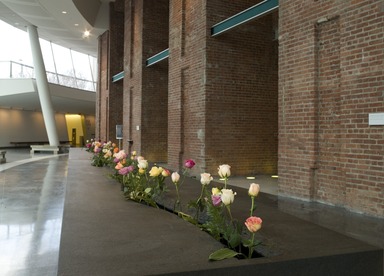

Lee Mingwei: The Moving Garden, October 05, 2011 through January 22, 2012 (Image: DIG_E_2012_Lee_Mingwei_Moving_Garden_01_PS4.jpg Brooklyn Museum photograph, 2012)
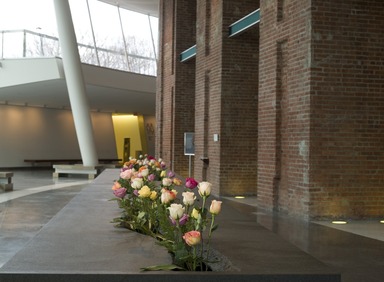
Lee Mingwei: The Moving Garden, October 05, 2011 through January 22, 2012 (Image: DIG_E_2012_Lee_Mingwei_Moving_Garden_02_PS4.jpg Brooklyn Museum photograph, 2012)
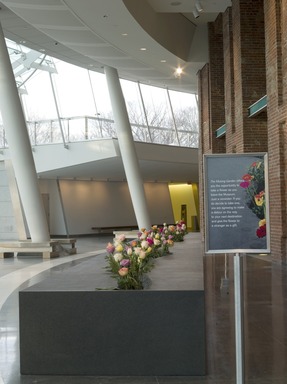
Lee Mingwei: The Moving Garden, October 05, 2011 through January 22, 2012 (Image: DIG_E_2012_Lee_Mingwei_Moving_Garden_03_PS4.jpg Brooklyn Museum photograph, 2012)
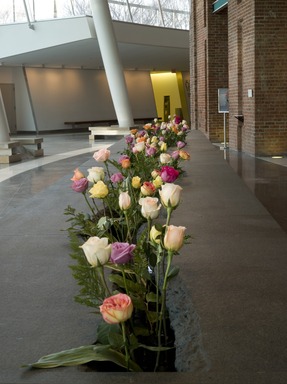
Lee Mingwei: The Moving Garden, October 05, 2011 through January 22, 2012 (Image: DIG_E_2012_Lee_Mingwei_Moving_Garden_04_PS4.jpg Brooklyn Museum photograph, 2012)
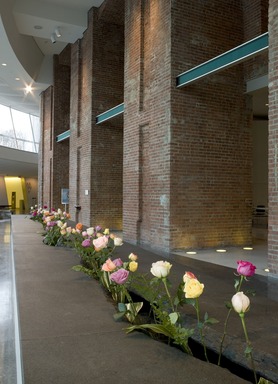
Lee Mingwei: The Moving Garden, October 05, 2011 through January 22, 2012 (Image: DIG_E_2012_Lee_Mingwei_Moving_Garden_05_PS4.jpg Brooklyn Museum photograph, 2012)

Lee Mingwei: The Moving Garden, October 05, 2011 through January 22, 2012 (Image: DIG_E_2012_Lee_Mingwei_Moving_Garden_06_PS4.jpg Brooklyn Museum photograph, 2012)
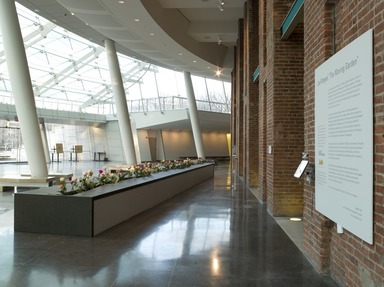
Lee Mingwei: The Moving Garden, October 05, 2011 through January 22, 2012 (Image: DIG_E_2012_Lee_Mingwei_Moving_Garden_07_PS4.jpg Brooklyn Museum photograph, 2012)
Lee Mingwei: The Moving Garden
-
Lee Mingwei: "The Moving Garden"
An orchid-filled granite tabletop, The Moving Garden welcomes visitors to the Brooklyn Museum with its beauty and majestic presence. The large installation on view here, however, is only a small part of what constitutes this work of art. Over the course of a day, the individual orchid blossoms set around the channel that runs the length of the tabletop begin to disappear as visitors take them, one by one. In contrast, the stems of orchids in the center remain on view at all times.
Those of you who decide to take an orchid blossom are thereby agreeing to a condition set forth by the artist: if you take a flower, when you leave the Museum you promise to make a detour on the way to your next destination and give the flower to a stranger as a gift. This personal interaction, the offering and acceptance of a gift, is the most significant aspect of The Moving Garden. The act takes place beyond the walls of the Museum, and only the participants are aware that is is happening.
Invited to take part in the Lyon Biennale in 2009, Lee conceived of the piece while making a preliminary visit to the city during the spring, when flowers were blossoming. As he was sitting near the Rhône River, which runs through the city, he was delighted by the unexpected sight of hundreds of flowers floating downstream.
The Moving Garden is associated with relational or participatory art, forms in which the artist becomes a kind of stage producer who engages audience members in creating the work. Spectators become active participants. The work of art unfolds over time and manifests itself in an action, rather than in an object.
If you wish, you may document your gift of a flower to a stranger.
Eugenie Tsai
John and Barbara Vogelstein Curator of Contemporary Art
-
June 1, 2011
Lee Mingwei: “The Moving Garden,” an installation comprising a forty-five-foot-long granite table with one hundred freshly cut flowers that appear to grow out of a channel that runs the length of the table, will be on view in the lobby of the Brooklyn Museum from October 5, 2011, through January 22, 2012. Created by New York-based artist Lee Mingwei, this interactive installation invites visitors to take a flower when they leave the Museum, on the condition that they make a detour on the way to their next destination and give the flower to a stranger as a gift. As the day wears on, the flowers at the Museum disappear, one by one. The next day, the flowers are replaced and the cycle begins again.
The artist was influenced in part by reading Lewis Hyde’s The Gift: Imagination and the Erotic Life of Property, when he became intrigued by the beneficial effects of gifts, both on those who give them and on those who receive. Another inspiration came on a spring day while the artist was sitting along the banks of the Rhône River in Lyon and saw hundreds of flowers inexplicably floating downstream.
Lee Mingwei has been creating participatory works of art since the late 1990s. One of his earliest pieces, The Dining Project (1997), came out of his experience in New Haven while in the MFA program at Yale University. This project involved inviting members of the community to dine with him one-on-one in his studio. Recent works include Guernica in Sand (2008), The Mending Project (2009), and Trilogy of Sounds (2010).
Born in Taiwan in 1964, Lee lives and works in New York. He is a graduate of the California College of Arts and received an MFA from Yale. He has had solo exhibitions and has been represented in group shows in the United States, Europe, Asia, and Australia. A catalogue published by the Brooklyn Museum accompanies the exhibition, which has been organized by Eugenie Tsai, John and Barbara Vogelstein Curator of Contemporary, in close cooperation with the artist.
The exhibition is made possible by the Taipei Cultural Center and by generous support from Rong-Chaun Chen, Jane Lombard and Richard J. Lombard, Amy and Leo Shih, and Wen-Chuan Tseng.
Press Area of Website
View Original
